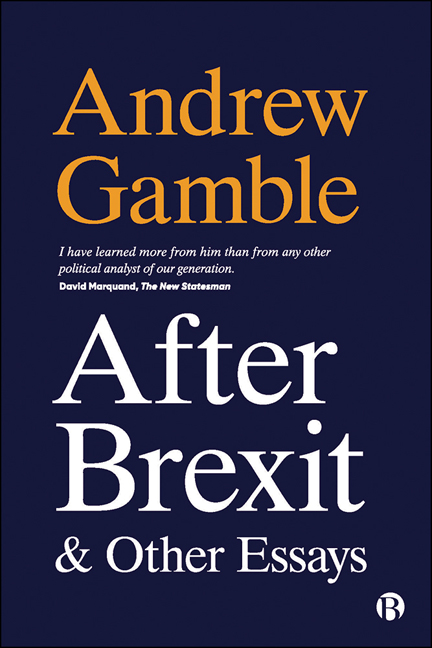Book contents
- Frontmatter
- Dedication
- Contents
- Preface
- Introduction: Historical Contexts
- Notes on the Essays
- 1 After Brexit (2019)
- 2 Explanations of British Decline (1999)
- 3 The European Disunion (2006)
- 4 The Anglo–American World View (2019)
- 5 The Free Economy and the Strong State (1979)
- 6 Thatcherism and Conservative Politics (1983)
- 7 Economic Growth and Political Dilemmas (1983)
- 8 The Crisis of Conservatism (1995)
- 9 The Thatcher Myth (2015)
- 10 Theories of British Politics (1990)
- 11 The Constitutional Revolution in the United Kingdom (2006)
- 12 What’s British about British Politics? (2016)
- Epilogue: Last Thoughts
- Notes
- Acknowledgements
- Index
12 - What’s British about British Politics? (2016)
Published online by Cambridge University Press: 22 December 2021
- Frontmatter
- Dedication
- Contents
- Preface
- Introduction: Historical Contexts
- Notes on the Essays
- 1 After Brexit (2019)
- 2 Explanations of British Decline (1999)
- 3 The European Disunion (2006)
- 4 The Anglo–American World View (2019)
- 5 The Free Economy and the Strong State (1979)
- 6 Thatcherism and Conservative Politics (1983)
- 7 Economic Growth and Political Dilemmas (1983)
- 8 The Crisis of Conservatism (1995)
- 9 The Thatcher Myth (2015)
- 10 Theories of British Politics (1990)
- 11 The Constitutional Revolution in the United Kingdom (2006)
- 12 What’s British about British Politics? (2016)
- Epilogue: Last Thoughts
- Notes
- Acknowledgements
- Index
Summary
Britain is a settled polity. It has been a full democracy for almost one hundred years, and it has representative institutions and a continuous political tradition stretching back to the seventeenth century. During that time its external fortunes have risen and fallen but it has not experienced either internal revolution or external invasion and occupation. Many have argued that it is this experience which has made Britain special, the essential context for understanding its politics, and its success in managing orderly and peaceful change.
Britain is also a troubled polity. The unity of the United Kingdom was first broken when Ireland separated in 1921, and in recent decades it has been threatened again by the conflict in Northern Ireland and by the rise of the Scottish National Party (SNP) to dominate the politics of Scotland. It only narrowly lost the referendum on independence in September 2014, and the issue has not been closed. Britain held another referendum, on its future within the European Union, in June 2016. By a narrow margin (52:48) Britain voted to Leave, but there were different votes in the four nations of the UK. England and Wales voted to Leave, while Scotland and Northern Ireland voted to Remain. Britain's external standing and global reach have declined sharply in the last hundred years as its empire collapsed and its industrial pre-eminence receded. Trust in the integrity and competence of its political class has weakened too, because of the 2008 financial crash and its aftermath, inconclusive military interventions such as Iraq and Libya, political scandals and anxieties about immigration. The mismatch between representative institutions and grassroots democracy has steadily grown, with anti-system and anti-politics insurgencies challenging established elites.
Does any of this make British politics distinctive? Does Britain's experience stand out from the experience of any other European state of similar population and resources in the last seventy years?
Every nation-state in the modern world claims that its own experience is special, and has developed its own national myth. That makes states different but does it make them distinctive? Or are all modern states just variations on a common theme?
- Type
- Chapter
- Information
- After Brexit and Other Essays , pp. 231 - 250Publisher: Bristol University PressPrint publication year: 2021



